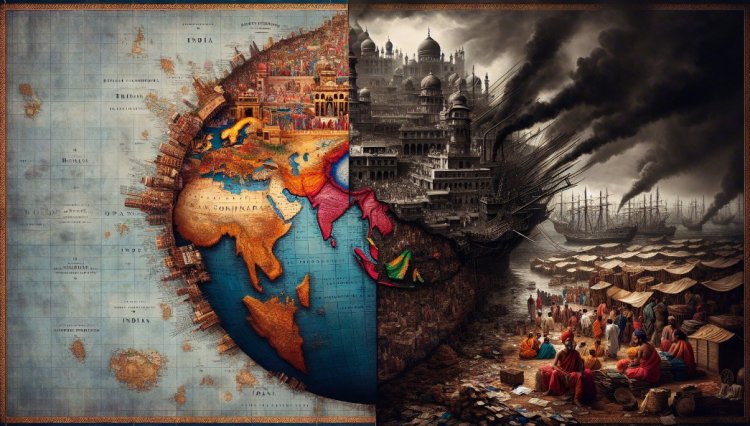What The British Really Did To India : The Gruesome Reality of the British Raj
Unmasking the dark side of colonialism: Dive into the brutal reality of the British Raj in India. Explore its exploitative policies, systemic violence, and devastating consequences, beyond romanticized narratives.

The Legacy of Colonialism
At the start of the 20th century, Europe's colonial empires held significant control over various regions on the global map. Britain, renowned for its extensive empire, regarded the Indian subcontinent as a precious gem in its possession. Although there may be differing opinions regarding the effects of British colonialism, a thorough examination of the history of British India offers a definitive response.
The British East India Company, a prominent enterprise rather than Britain itself, took control of the Indian subcontinent. The Mughal Empire during the 18th century was politically unstable yet remarkably prosperous. It held a significant share of the global economy, amounting to 23% in the year 1700.
The Opportunity for Exploitation
Upon the downfall of the Mughal empire, the British East India Company recognized a significant prospect. By engaging in conflicts and strategic tactics, the company successfully acquired dominion over a vast and prosperous state, ranking among the largest and most affluent in the world.
Throughout the next century, the company's influence grew until the Indian Mutiny of 1857, which led to the British government assuming direct authority over the nation. The British Empire released its control over the subcontinent when India achieved independence in 1947.
The Economic Exploitation
It is impossible to have a conversation about the British Empire without acknowledging the economic exploitation that occurred. Throughout their reign, Britain caused the deindustrialization of South Asia, depending on its resources to drive its own industrial growth. India, which was once a prominent exporter of textiles, experienced a decline in its share of the global textile trade, reaching a meager 8% by 1896.
The policies of the British government showed a preference for bringing British textiles into India, which resulted in India becoming reliant on British products and causing significant harm to Indian industries.
The British East India Company established a monopoly on Indian trade, effectively obtaining Indian goods without payment. As a result, Britain was able to fund its own industrial revolution, while India faced economic hardships. According to economists, it is estimated that Britain extracted approximately $45 trillion from India during the period from 1765 to 1938. This amount is astonishingly 14.5 times larger than the current size of the British economy.
Exploitation beyond Economics
India's exploitation went beyond just economic factors. The Indian populace had no choice but to endure the weight of British imperialism. Indian taxes funded two-thirds of the British Empire's standing army, and Indian troops fought and died in both world wars, all while their elected political leadership was imprisoned.
The British government prioritized its own interests, leaving millions to starve during famines.
The Gruesome Truth
When considering the effects of British colonialism, it is impossible to overlook the somber truth. The British government's focus on free trade resulted in the unfortunate loss of millions of lives due to famine. India, a once prosperous nation, has unfortunately been left in a state of poverty with widespread illiteracy.
When we compare Japan's rapid development without colonization to the effects of British rule, it becomes even more apparent how devastating the latter was.
The Need for Truth
According to a recent survey, a considerable number of Britons lack awareness regarding the true essence of the British Empire. Surprisingly, a significant portion of these individuals hold the belief that the empire brought advantages rather than hardships. It is of utmost importance that we educate people about the reality of the British Empire, recognizing the acts of theft, starvation, and mass murder that took place during its rule. We can secure a fairer and more equal future only through education and comprehension.
Frequently Asked Questions
Q: Did the British Empire bring any positive contributions to India?
Although some contend that the British Empire brought parliamentary democracy and the civil service system of government to India, it is crucial to acknowledge that these advancements were not without significant consequences. The utilization of India's resources and the destruction of its economy greatly surpass any possible advantages.
Q: How did the British empire impact the Indian economy?
The British Empire caused the deindustrialization of India, which weakened its textile industry and led to a reliance on British products. India has experienced a notable decrease in its portion of the worldwide textile trade, resulting in an economic downturn and increased poverty levels.
Q: What role did India play in the world wars?
India provided the highest number of soldiers to the British imperial forces during both world wars. Indian soldiers valiantly battled and made the ultimate sacrifice in service of the British Empire's objectives, while their democratically elected political leaders endured imprisonment.
Q: How did the British Empire contribute to famines in India?
The policies and neglect of the British government resulted in severe famines in India that caused great devastation. Countless individuals perished due to starvation, as the government placed utmost importance on unrestricted commerce and adamantly declined to intervene to preserve human lives.
Q: How has the perception of the British Empire evolved?
There are still many Britons who have misunderstandings about the British Empire. They believe that it brought advantages instead of recognizing the pain and suffering it caused. It is of utmost importance that we acquire knowledge and impart accurate information regarding the empire's disturbing historical heritage.



 admin
admin 










